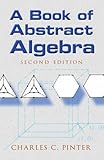The other recommendations given so far for abstract algebra are fine, but Pinter's organization makes it I think work better for self-study, and it is much more friendly on the wallet because it is a Dover edition. It's currently $14.89 on Amazon ($6.49 eBook).
ABoAA tends to divide the material into short chapters with lots of exercises. A typical chapter is around 5 pages of text and 5 pages of exercises. The ratio of text to exercises varies a bit but mostly will be in the 40-60% range for the text. Chapters are mostly around 10 pages +/- 3.
The exercises for each chapter are split into several sections each section covering a different aspect of the chapter's material. Sometimes there is a section of exercises applying the material to some interesting area. For example, the chapter on groups of permutations has 6 pages of text, then 5 pages of exercises divided into N sections.
The exercise sections for that chapter are computing elements in S6 (5 problems), examples of groups of permutations (4 problems), groups of permutations in R (4 problems), a cyclic group of permutations (4 problems), a subgroup of SR (4 problems), symmetries of geometric figures (4 problems), symmetries of polynomials (4 problems), properties of permutations of a set A (4 problems), and algebra of kinship structures which consists of 9 problems covering how anthropologists have applied groups of permutations to describe kinship systems in primitive societies.
This combination of small chapters with lots of exercises organized in small groups of related exercises makes it a lot easier to fit this book into a self-study plan if you are like the typical self-study student who has other things (like work) taking up much of their time and so can't get in many long study sessions.
[1] https://www.amazon.com/Book-Abstract-Algebra-Second-Mathemat...
It's available in a Dover edition for under $16 so it is easy on the budget too [1].
[1] https://www.amazon.com/Book-Abstract-Algebra-Second-Mathemat...
What is it that you find challenging about math? If it's the actual computation/calculation -- the part where you are finding a numeric answer -- don't worry, that's nowhere to be found in abstract algebra (or any higher level math). Pure math (of which abstract algebra is a part) is about the study of patterns more than anything that has to do with numbers.
In fact, the name "abstract" refers to the fact that it's concerned with abstract collections of things -- for instance, groups. You'll study sets of operations on groups -- if you are able to identify Collection X as a group, you immediately know you can apply theorems a, b, c, etc. to it. For these reasons, the sort of things you are likely learning in pre-alg on Khan Academy don't have much direct applicability.
I think it's an enormously beneficial subject for programmers to study, maybe the only math course beyond the standard discrete math that I think should be required. (I want to add category theory, but I don't feel I can as I only have the barest grasp of the fundamentals myself...) As with all pure math courses, it will quickly move beyond the depth/level you can actively use in programming, but the mind-expanding it does is really great at encouraging the sort of abstract thinking the OP's post is about. It has strong relations to generics, interfaces, polymorphism, etc.
As for how to get into it, I used this book: https://www.amazon.com/Book-Abstract-Algebra-Second-Mathemat....
It does not provide answers to every exercise--maybe 10% tops--but a lot of the exercises are small and should not be any problem. These are often in a group, where he takes something that would be one hard exercise in another book and breaks it down almost to the level it would be if were part of the main text, leaving just small thing for you to fill in as exercises.
There are a few recurring themes throughout the exercises, where he applies the material of the chapter to some specific application in several exercises (e.g., error correcting codes if I recall correctly), and subsequent chapters continue with those themes in their exercises.
[1] https://www.amazon.com/Book-Abstract-Algebra-Second-Mathemat...
"A Book of Abstract Algebra: Second Edition" by Charles C. Pinter [1].
"How Not to Be Wrong: The Power of Mathematical Thinking" by Jordan Ellenberg [2].
"Guns, Germs, and Steel: The Fates of Human Societies" by Jared Diamond [3].
"Introduction to Analytic Number Theory" by Tom M. Apostol [4].
"Algorithmic Puzzles" by Levitin and Levitin [7].
I've also got a 46 books in my Safari Library queue, although only about half a dozen are actually in the in progress state.
In addition to the above, I'm about 3 years behind on Analog, the science fiction magazine. Those are all on my Kindle and I'm slowly trying to catch up.
Recently finished:
"Moonwalking with Einstein: The Art and Science of Remembering Everything" by Joshua Foer [5].
Probably going to pick up soon:
"The Greatest Story Ever Told--So Far" by Lawrence M. Krauss [6]. Flipped through it at a bookstore and there were some very interesting things in it.
[1] https://www.amazon.com/Book-Abstract-Algebra-Second-Mathemat...
[2] https://www.amazon.com/gp/product/B00G3L6JQ4/
[3] https://www.amazon.com/Guns-Germs-Steel-Fates-Societies/dp/0...
[4] https://www.amazon.com/Introduction-Analytic-Number-Theory-A...
[5] https://www.amazon.com/Moonwalking-Einstein-Science-Remember...
[6] https://www.amazon.com/Greatest-Story-Ever-Told-So-Far-ebook...
[7] https://www.amazon.com/Algorithmic-Puzzles-Anany-Levitin/dp/...
https://www.amazon.com/Algebraic-Scientists-Engineers-Mathem...
https://www.amazon.com/Book-Abstract-Algebra-Second-Mathemat...
* Burns' "Groups: A Path to Geometry": http://www.amazon.com/Groups-Geometry-R-P-Burn/dp/0521347939
This was the main read. It's approach is to take the reader through group theory by presenting it as a series of problems. Discussion is limited mainly to historical notes.
* Pinter's "A Book on Abstract Algebra": http://www.amazon.com/Book-Abstract-Algebra-Second-Mathemati...
While going through Burns' book, if I needed more of a discussion on a certain topic, then Pinter's book always felt like it comfortably quenched my desire. Here is someone's discussion on why Pinter helped (along with a proposed litmus test for group theory texts): http://math.stackexchange.com/questions/1469294/recommendati...
http://www.amazon.com/Book-Abstract-Algebra-Edition-Mathemat...
. . . along with paper for working the exercises.


The chapters are usually short, maybe 8-12 pages, with about half that being lots of exercises to help cement your understanding of the material. This greatly helps with self-study. And it's a Dover edition so is inexpensive.
[1] https://www.amazon.com/Book-Abstract-Algebra-Second-Mathemat...